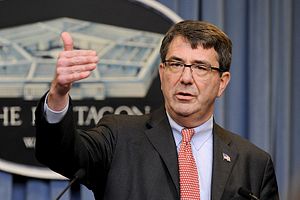Just two weeks into his new job, U.S. Defense Secretary Ashton Carter is aggressively attacking proposed spending cuts while defending the fiscal year 2016 defense budget request of $534 billion in base budget and $51 billion in overseas contingency operations (OCO). The budget request exceeds congressionally mandated spending caps by $38 billion.
Testifying in front of the Senate Armed Services Committee along with the Chairman of the Joint Chief of Staff Gen. Martin Dempsey, Carter vehemently emphasized: “This committee and this Congress will determine whether our troops … can continue to defend our nation’s interests around the world with the readiness, capability and excellence our nation has grown accustomed to, and sometimes taken for granted.”
“Halting and reversing the decline in defense spending imposed by the [2011] Budget Control Act, the president’s budget would give us the resources we need to execute our nation’s defense strategy. It would ensure we field a modern, ready force in a balanced way, while also embracing change and reform, because asking for more taxpayer dollars requires we hold up our end of the bargain — by ensuring that every dollar is well spent,” the defense secretary said.
Should the budget cuts be enacted, “our national defense strategy will simply no longer be viable. Conflict will take longer to resolve,” argued Gen. Dempsey. He also elaborated that a reduced budget would leave “no slack, no margin for error or strategic surprise.”
Carter added that U.S. opponents are “probably thinking, ‘What are these guys doing to themselves?’” He also notes that the current budget debate could be interpreted as “a lack of will” by America’s allies abroad.
Armed Services Committee Chairman Sen. John McCain (R-Ariz.) concurred with the defense secretary’s and the Joint Chiefs Chairman’s statements in spirit: “With each passing year since the BCA was enacted in 2011, and with the United States slashing its defense spending as a result, the world has become more dangerous, and threats to our nation have grown. I don’t think that is purely a coincidence.”
As I reported before, many analysts argued that the fiscal year 2016 defense budget request will in all likelihood “die a long complicated death as it winds its way through the congressional committees.” Experts point out that there is a fundamental discrepancy between today’s budget request and the Pentagon’s overall defense strategy. However, a congressional budget deal, similar to the one negotiated in 2014, can provide some relief from the cuts in 2016.
This, however, will only temporarily fix the problem: U.S. strategists need to seriously re-consider the prominent role of America’s military in executing the nation’s foreign policy and safeguarding its national interests. I’ve written more about this problem here, here, and here.

































